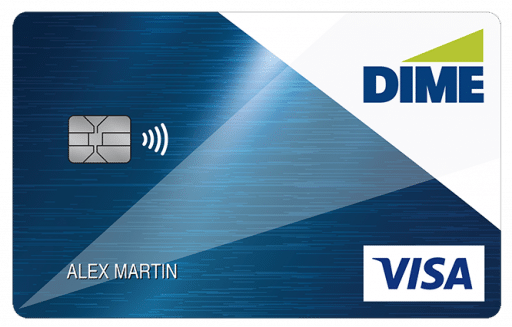
Treasury management solutions
Dime’s Surcharge Program
Through Dime’s surcharge program, merchants can transfer credit card processing fees on to their customers, resulting in significant annual savings for business owners. This allows customers to be given a credit card option without leaving business owners responsible for any additional costs.
What you need to know

A surcharge is a fee that a merchant adds to a consumer’s bill for paying a merchant with a card that is not charged on other forms of payment accepted by a merchant. Benefits of a surcharge program include:
- Merchants receive 100% of the sales price when customers pay by credit card – zero transaction fees
- Compliant with major credit card networks and with individual state restrictions
- Seamless integration with compatible POS systems
- Automatic surcharge alert and notice of alternative payment options

Merchants can offer discounts to incentivize cardholders to pay with an alternative method. It’s called a “discount offer” or, more commonly, a “cash discount.” To comply with the rules, merchants must display prices in either of these ways:
- Only the card price per item
- Both the card and the cash price listed side-by-side per item
The Merchant Surcharge Process
U.S. merchants that intend to surcharge are required to:
- Notify your acquirer at least 30 days prior to commencing surcharging
- Include the surcharge amount within a dedicated data field (labeled Field 28) in the transaction message sent to Visa (your acquirer will enable the population of this field)
- Limit surcharging to credit cards only (debit cards and prepaid cards cannot be surcharged)
- Limit the amount to your merchant discount rate (MDR) for the applicable credit card or 3% whichever is lowest
- Disclose the surcharge as a merchant fee and, for both in-store and online transactions, clearly alert consumers to the practice at the point of entry, the point of sale or transaction, and on every receipt
- Merchants should also consider whether they comply with all applicable state and/or federal laws.
Features and Benefits:
- Reduce processing fees and grow your revenue
- Compatible with all major card brands and payment methods
- Give your customers the option to avoid processing fees
- Dedicated, personalized support for every merchant
- Same day funding
- IC+ & Flat Rate Processing
- PCI Compliant
Make the smart choice with Payroc ConsumerChoice
ConsumerChoice offers a solution to businesses seeking to reduce their merchant processing expenses. With dual pricing on the terminal, customers are given a clear choice for their payment method. The displayed card price includes the cost of payment acceptance.
Ultimate Savings Across the Board
- Businesses choose to pass some or all of the cost of acceptance to the consumer
- Empower consumers with the choice to select cash or card
- Cut or eliminate processing costs
Frequently Asked Questions
A payment card surcharge, also known as a checkout fee, is an additional fee that a merchant
adds to a consumer’s bill when he or she uses a card for payment.
As a result of a legal settlement to resolve claims brought by a group of U.S. merchants,
merchants in the U.S. and U.S. territories may add a surcharge to certain credit card
transactions, starting January 27, 2013. Merchants who choose to surcharge must follow
consumer disclosure and other requirements agreed to as part of the settlement.
U.S. merchants must first notify Visa and their acquirer of their intent to surcharge at least 30
days prior to implementing surcharging. Merchants can submit a notification form to Visa at
www.visa.com/merchantsurcharging. Merchants may not begin surcharging until January 27,
2013.
card transactions?
Before choosing to surcharge, U.S. merchants may want to consider a number of factors,
including:
– the potential impact on your customers’ experience
– what your competitors might be doing
– what information must be disclosed to your customers, and how
– cost of credit cards and other forms of payment
U.S. merchants that intend to surcharge are required to:
– Notify Visa and your acquirer at least 30 days in advance of beginning to surcharge; a
notification form to Visa can be submitted at www.visa.com/merchantsurcharging.
– Limit surcharging to credit cards only (no surcharging debit and prepaid cards) and
limit the amount to your merchant discount rate for the applicable credit card
surcharged.
– Disclose the surcharge as a merchant fee and clearly alert consumers to the practice at
the point of sale – both in store and online – and on every receipt. Merchants should
also consider whether they comply with all applicable state or federal laws. Currently,
10 U.S. states have surcharging restrictions including California, Colorado,
Connecticut, Florida, Kansas, Maine, Massachusetts, New York, Oklahoma and Texas.
More information on rules and requirements related to surcharging can be found at
www.visa.com/merchantsurcharging.
No. The ability to surcharge only applies to credit card purchases, and only under certain
conditions. U.S. merchants cannot surcharge debit card or prepaid card purchases.
debit card chooses “credit” on the point of sale terminal?
No. The ability to surcharge only applies to purchases made with a credit card, and only under
certain conditions.
Yes. U.S. merchants may assess a surcharge on credit card purchases that does not exceed the
merchant discount rate for the applicable credit card surcharged. More information can be
found at www.visa.com/merchantsurcharging.
Yes, however, merchants must surcharge Visa on the same terms and conditions as any equal
or higher cost competitor that imposes limits on surcharging.
Yes. U.S. merchants that surcharge must disclose the surcharge dollar amount on every
receipt. In addition, disclosures that a merchant outlet assesses a surcharge on credit card
purchases must be posted at the point-of-entry and point-of-sale. Disclosure requirements
and sample compliant signage can be found at www.visa.com/merchantsurcharging.
Currently, 10 U.S. states have surcharging restrictions including California, Colorado,
Connecticut, Florida, Kansas, Maine, Massachusetts, New York, Oklahoma and Texas. Please
consult with legal counsel to determine whether your practices comply with relevant state
law.
surcharging in some states where I operate, but not others – does that mean I can’t
surcharge in any of the states where I operate?
No. If a merchant is prohibited from surcharging in one state, Visa’s rules do not prevent the
merchant from surcharging in other states that allow the practice.
U.S. merchants have the option to add a surcharge at the “brand level” to all Visa credit card
transactions, or to particular types of Visa credit card transactions at the “product level” (e.g.,
Visa Traditional, Visa Traditional Rewards, Visa Signature), but not both.
No. The settlement agreement impacts Visa’s rules related to the surcharging of credit card
purchases made in the U.S. and U.S. territories only. Surcharging remains prohibited outside
the U.S. unless there is a local law or variance that requires merchants be permitted to engage
in the practice.
requirements for surcharging and other related information?
Merchants can access this and other information by visiting
www.visa.com/merchantsurcharging.
Information provided here is subject to Visa’s operating regulations relating to surcharging.


